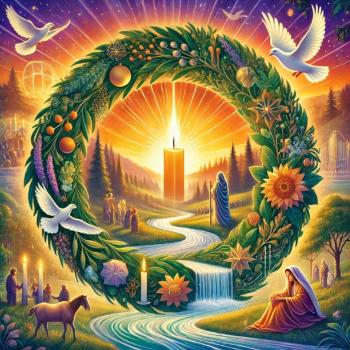The Adventurous Lectionary – The First Sunday of Advent – December 3, 2023
Isaiah 64:1-9
Psalm 80:1-7, 17-19
I Corinthians 1:1-9
Mark 13:24-37
The Advent Spirit:
Today’s Sunday might be described as New Year’s Day in the Christian liturgical year. Advent is a season of awe and wonder. It is a time of waiting, not just for Jesus’ birth, but for the transformation of our lives and the world. Something is being born in us and we are waiting for its arrival. Advent is a time of holy restlessness and prophetic protest. Advent reflects the unfinished nature of creation, the horizon that recedes with each step we take toward it. God brought forth an unfinished universe, requiring our participation in its ongoing history. Jesus the Christ came to earth, healed the sick, shared the vision of Shalom, died, and rose again, and yet his ministry is unfinished, and the world he came to save still reflects the ambiguity of beauty and brokenness, salvation and sickness. Jesus has come and we are still waiting. Joining restlessness and peace is at the heart of the advent adventure. (For more on our Advent adventures, see Bruce Epperly, Adventurous Advent: Days of Awe and Wonder and Mark’s Holy Adventure: Preaching Mark’s Gospel for Year B.)
Advent is a difficult season. Advent is the dream of the future, the hope for a different world, the vision of the moral and spiritual arcs incarnate in our histories and the decisions of national leaders. It is more than waiting for Christmas; it is waiting for Christ’s birth, God with us, to be recognized and embodied in our world.
The Prince of Peace has come to earth as a child and yet, as I write these words, children are huddling wit their parents on the USA borderlands, families mourn in Israel and Gaza, presidential candidates invoke the language of Hitler, political leaders see themselves as chaos creators in the political arena, and millions of persons – benighted by political leaders – deny humanity’s role in climate change not to mention the obvious 2020 election results. Democracy is fragile as many “Christians” appear to be content with authoritarian leaders and resemble the complacent fellow travelers of 1930’s Germany. The Prince of Peace is among us, a child and healer, and yet the reality of sin is apparent in polarization, alienation, racism, and violence, often perpetrated in the name of law and order.
We are waiting. Restlessly waiting. Yes, we are waiting to become our deepest selves, to live by love and not fear, to fulfill our dreams and God’s dream of Shalom, to live in a nation committed to liberty and justice for all. We need God’s creative transformation. In Advent, we are tempted to give up hope for transformation, on the one hand, or claim premature transformation on the other. In our hope for deliverance, we can chart the signs of the times, re-dating them with every mistaken calculation, while waiting for God to solve our problems and delighting in the fact that the “bad news is the good news” and a sign that Jesus will come soon. We can live in expectation of God tearing open the heavens and performing awesome deeds of transformation to liberate us from life’s ambiguities, while we do nothing to solve earth’s problems. When transformation is deferred, we can overemphasize our unworthiness and God’s angry withdrawal from our lives and communities, as Isaiah 64 asserts. Or, we can project that blame on others, vilifying them to support our own innocence. We need restoration, as Psalm 80 pleads, but has our sinfulness excluded us from God’s grace?
We need restoration but it must happen on earth as well as heaven. The hope of God’s fulfillment of history is an invitation to immersion not escape, responsibility not apathy.
The Scriptures of the Day:
The restless prophet Jeremiah joins the bad news of the present moment with hope in future divine liberation. Unlike today’s second coming prognosticators, the bad news is not a sign of deliverance for Jeremiah; the bad news is truly bad news, reflecting our faithlessness and the pain it brings to others. God has done great things, but we have turned away and provoked divine anger. God appears absent by God’s own choice, and God’s absence only exacerbates our waywardness. Yet, the grounds of our turning is from God is ambiguous: has God absented Godself and thus left us to our own devices, our waywardness as persons and as a nation, or have our actions led to divine absence?
Surely, God does not abandon us, but our abandoning of God’s ways can make us senseless to God’s presence in our lives and diminish God’s role in shaping our lives. The world lives by the incarnation of God, as the philosopher Whitehead says, but we can choose to midwife or abandon God’s birth in the world. We have a role that God can’t take away from us, and our role can help or hinder God’s presence in the world.
God cannot fully control us or the world. The passage suggests that we make a difference in God’s presence in our lives and the world. Our actions condition what God can do in the world. Still, we hope that our waywardness has not created an irreparable breach between us and God, and that God will overcome our sinfulness through creative and redemptive love.
Psalm 80 is also a plea for God to return. We yearn for God to be our companion once more. The relationship is definitely dialogical and relational. God and humankind shape each other’s responses. Our absence limits God, and thus diminishes our experience of divine guidance. God is not unchanging, but intimately related to the human condition in a dynamic call and response. Grace abounds, the shepherd seeks us, but will we welcome God’s love when it comes to us. (For more on the relational God, see Bruce Epperly, “Process Theology: A Guide for the Perplexed,” “Process Theology: Embracing Adventure with God,” and “Process Spirituality: Practicing Holy Adventure.”)
We can live by individualistic scarcity or divine abundance. To a conflict-ridden community at Corinth, Paul proclaims that the Corinthians have everything they need, individually and corporately, to be faithful. These words are addressed to our congregations as well when we are tempted to live by scarcity rather than divine abundance. I know how easy it is to live by scarcity and assume that our best years are gone by. It is easy to give up hope in the future. Yes, the world has changed and young families seldom stream into our churches. We are aging and wonder about the future with every funeral. Congregations shrink and the impact of American Christianity is diminished despite the machinations of Christian nationalists or theocrats, who may be one of the sources of the diminishment.
As congregations, we must be realistic financially and make adjustments in budget and in our stewardship as well as in our energy. Still,, focusing on our debits often disguises our gifts. We see what we don’t have and not the giftedness of God in our midst. We need to remember that we live in an open system in which new energies and possibilities are always emerging in our lives and communities. We are, as Paul proclaims, enriched in every way and graced by a love beyond our imagination. We have every spiritual gift we need, whether our community is flourishing or diminishing numerically. God is faithful and asks only that we faithfully respond to the grace we’ve received in our particular time and place and with our particular gifts and limits.
Is Jesus coming soon? Shall we prepare for the end of the world, by God’s hand? Or, is Jesus in fact advocating a type of “woke” spirituality? Jesus’ words, found in Mark’s Gospel, have inspired many to search for the signs of the times. Many still look for a literal and datable Second Coming, a deliverance from on high which will clearly separate the saved and unsaved, the favored and the lost, and assuredly we will be among the favored in God’s reckoning. When the hour comes part of our great joy, some have averred, will be to see the chaos and suffering of the world from our privileged place of deliverance! But, is such a deliverance “heaven” or “hell” if it means destroying this beautiful planet? Jesus does not want us to be so heavenly minded that we are no earthly good! Nor does Jesus want us to sacrifice this lifetime – this planet – for a Second Coming that simply does not come. We are not to wait for a divine rescue operation. We are to be partners in new creation and salvation in the here and now.
I believe that Jesus’ words take a different approach than the escapist and earth-destroying theology. They turn us from heaven to earth and passivity to activity. In invoking the fig tree as our guide to discerning the signs of the times, Jesus is suggesting that the transformation we yearn for will come through the natural world, the world of orderly causation, of seedtime and harvest, and not by subverting what we count on to live our daily lives. Transformation may be abrupt at times, but like the fig tree’s growth, the signs of transformation are all around us and within us. It may seem as if the sky is falling, but the meteorological changes, represented by darkened sun and falling stars are part of a divine economy in which the largest environment still remains dependable.
In today’s scripture, Jesus is cautioning us about claiming esoteric knowledge about the end times. He may be chastening the Left Behind, Rapture, and Thief in the Night crowd to calm down and get to work in healing the earth. Beware end-time preachers who know when the divine call comes. Don’t be so heavenly minded that you are no earthly good. Don’t look so far ahead that you fail to see God moving in this very moment of time. Jesus counsels us to be alert and to stay awake. Yes, there may be a dramatic moment in our lives and communities. We may be called upon to take a leap of faith into what appears to be an abyss of uncertainty. We may experience seismic spiritual shifts. But, God is faithfully moving in this moment, giving us clues and hints of transformation. We can live in God’s new age right now if our spiritual and physical senses are open to God’s coming in every event.
Advent is about active waiting that leads to agency. Advent joins restless prophetic hope with calm confidence in God’s promises. God is faithful and has planted signs of the times in our daily adventures. Stay alert! Be awake. Be woke. Don’t be confused by promises of a divine rescue operation or be befuddled by tinny Christmas carols. The birth of new life is coming, the signs are here. We have what we need to be faithful.
+++
Bruce Epperly is a theologian, professor, spiritual guide, seminary administrator, and author of over eighty books, including his five volume series on the “twelve days of Christmas” – the “twelve days of Christmas with Howard Thurman…Francis and Clare of Assisi…Madeleine L’Engle…Carols and Hymns…Celtic Spirituality,” as well as his book on the Incarnation, “From Cosmos to Cradle.” Other texts include “The Elephant is Running: Process and Open and Relational Theology and Process Theology” and “Process Theology: Embracing Adventure with God.” He can be reached at [email protected].











